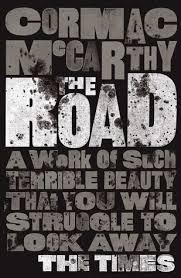The Road by Cormac McCarthy, USA, 2006
Although nothing is stated directly it is obvious that someone, somewhere, pressed that button and the world was thrown into a nuclear catastrophe. The novel begins about ten years after the event when the few survivors are trying to eke out an existence in a world where everything is dead and the surface is covered with grey ash.

The survivors fall into one of two categories – good guys or bad guys. The bad guys, the majority of whom have resorted to cannibalism as a way of surviving, rove the countryside in gangs, while the good guys have to divide their time between avoiding the bad guys and searching for food that will, perhaps, sustain them for at least one more day.
But there is practically no food left. Supermarkets and homes have been trashed and emptied and in a world where nothing can grow (and animals and fish are all dead) the survivors are ecstatic if they happen to find a few tins of beans in a forgotten cellar or some milk powder at the back of a kitchen cupboard.
The book revolves around a man and his son who are making a journey across America to the west coast. For some reason the man believes that things will be better on the coast. When it is safe to do so they walk along the ash-covered road, pulling a cart with their meagre belongings. When they suspect that there may be gangs on the road they move into what was once forest but which is now a surreal place of ash and dead trees.
The boy was born around the time of the catastrophe and knows nothing else; the stories that his father tells him of trees and animals and towns with people are, for him, simply fairy stories or myths.
In spite of the horror around them, the man and his son retain their humanity and their love and concern for each other, and it is this that pushes them on towards their goal. Outwardly the man is superficially optimistic for his son’s sake, but inwardly he knows that there can be only one ending.
This is a beautiful, sad, yet horrific, book. The writing is piercingly realistic, yet, at the same time, poetic, and McCarthy’s descriptions of the landscape makes one feel that he must have experienced it at first hand, but, of course, he hasn’t. The anonymity surrounding the man and boy (we do not know their names) opens up the story to include everyone, even the reader. This is a book that will make you think while it acts as a graphic warning as we hurtle closer and closer towards total destruction.
The photo of Cormac McCarthy is from The Telegraph